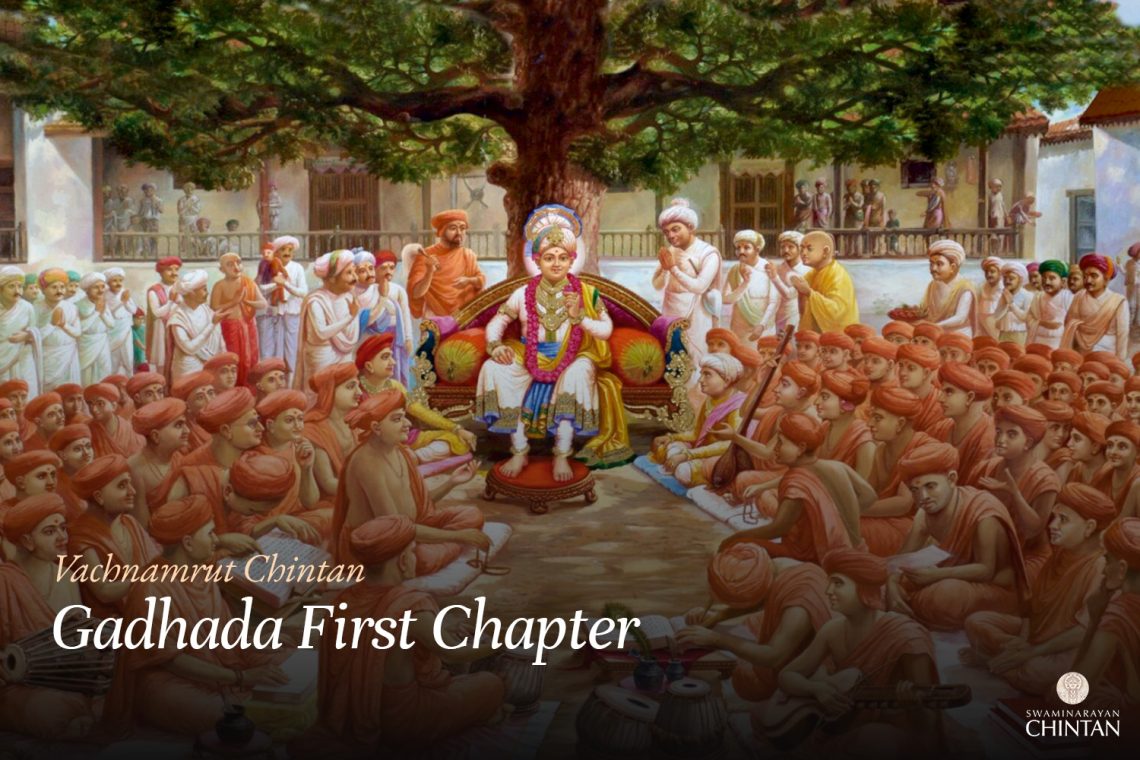Central Insights:
- Do not invalidate righteousness under the pretext of Knowledge.
Key Points:
The one who invalidates righteousness under the pretext of knowledge are Asur (Evil minded) Those learned individuals who negate Dharma are Asur (Evil).
Explanation
Shreeji Māharāj says that those learned individuals who use their knowledge or their firm conviction to negate Dharma are Asur (Evil). Shreeji Māharāj likes wisdom and firm faith but does not like violating Dharma. A devotee’s ultimate goal should be to gain Māhātmyagyān (glory along with knowledge) and Bhakti (devotion) but it should not be at the expense of violating Dharma. This is the essence of what Māharāj is trying to say.
There are many who have lost their internal battles or are weak internally that roam in the guise of devotees and use the shāstras to encourage violating Dharma.
यथैधांसि समिद्धोऽग्निः भस्मसात् कुरुतेऽर्जुन ।
ज्ञानाग्निः सर्वकर्माणि भस्मसात् कुरुते तथा ॥
yathaidhāṁ si samiddho’gnir bhasmasāt kurute’rjuna |
jñānāgniḥ sarvakarmāṇi bhasmasāt kurute tathā ||
(Gita – 4:37 )
The flame of Wisdom burns down all actions to ashes. A Gyāni does not sin. Whereas the pretext of devotion is as follows: नाम्नो यावति शक्तिः – nāmno yāvati śaktiḥ. The name of God is so powerful that a person does not have the same power to sin. This Mahimā of God is however based on experience and objective. Using this as a pretext to encourage violation of Dharma gives a person’s mental weaknesses a clear path, but in reality, such knowledge and Mahimā is something one does not have.
Here there is one more point to think about: not all good and well-wishing devotees use knowledge to negate Dharma. Dharma and Bhakti are the symbols of good attributes. Good attributes are derived from knowledge per the shāstras such as Yatindramatadīpikā. All good attributes are developed through devotion, as per Prahlādji in the Bhāgawat. Hence wisdom and Bhakti are the symbol of all good attributes.
Similar to how through the oath of knowledge or oath of firm conviction a person does not encourage the violation of Dharma, likewise when a person has internal cleanliness and desire to serve at the feet of Shreeji Māharāj, they should not use their good attributes, features, and other characteristics to encourage violation of His commandments.
For example: A householder who donates to the Temple or another religious site, should not have the expectation to use the Mandir’s vessels for their children’s wedding or consider borrowing resources because of their charitable contribution.
Secondly, a Saint or Priest should not feel that if they are performing a lot of service at the Temple, that there is no need to follow all the rules. They should not feel that Māharāj would allow some things to slide since their positive contributions outweigh any misdeeds they would like to carry out.
This person’s contributions and service are worth praising. A ledger of good and bad deeds should be kept and balanced. However, Māharāj says that if a person, based on their position, can follow one Dharma (penance, service, donation, etc.) a lot more than another, then this does not mean that the person can violate all the other Dharma or believe that all will balance out when it is time for judgement.
A person’s weakness is one thing whereas, It is possible that weakness can be present in great personalities, but to be able to recognize weakness is a great fortune. All our virtues and our contribution should be to please Māharāj and in dedication to Māharāj. Only then it can be for once salvation, else it would be considered as one’s own worldly comfort. Our special services to Māharāj, our virtus for Māharāj, and our weaknesses or brakes in the commands of God both tobe very separately presented before God.
Devotees should not make an account or calculations and present before God that these are the favours and services I have performed for you. So, please correct me some day. Māharāj knows better than us. One should present in an actual way, as it is. By Virtues God gets pleased and the weakness to be presented as weakness only and for it one should pray to God. God is merciful and God will consider any services rendered to him as a devotion. God will not do calculations and surely forgive. The Devotee should not have a mindset that – as it is my right, can’t I ask even this? (are we asking something for free?). Only then it means one has not made any excuses. So our knowledge, devotion or virtues should be directed to please God and not to find excuses to nourish one’s own weaknesses. The intention of a devotee should be like none of his virtues or talent to be used in nourishing his own weakness or in finding excuses.
Glossary
| Asur – Evil-minded or demonic in nature. |
| Bhakti – Devotion Loving and selfless worship of God. |
| Desh – Place The environment in which a person resides, which influences their thoughts and behavior. |
| Jnanagni – The flame of wisdom that burns down all actions. |
| Mahatmyagyan – Knowledge of the glory and greatness of God. |
| Namasakti – The power of God’s name. |
| Penance – A religious act performed to seek forgiveness or demonstrate devotion. |
| Virtues – Positive qualities or traits demonstrated through actions. |
| Weakness – A personal flaw or failure to follow God’s commands. |

